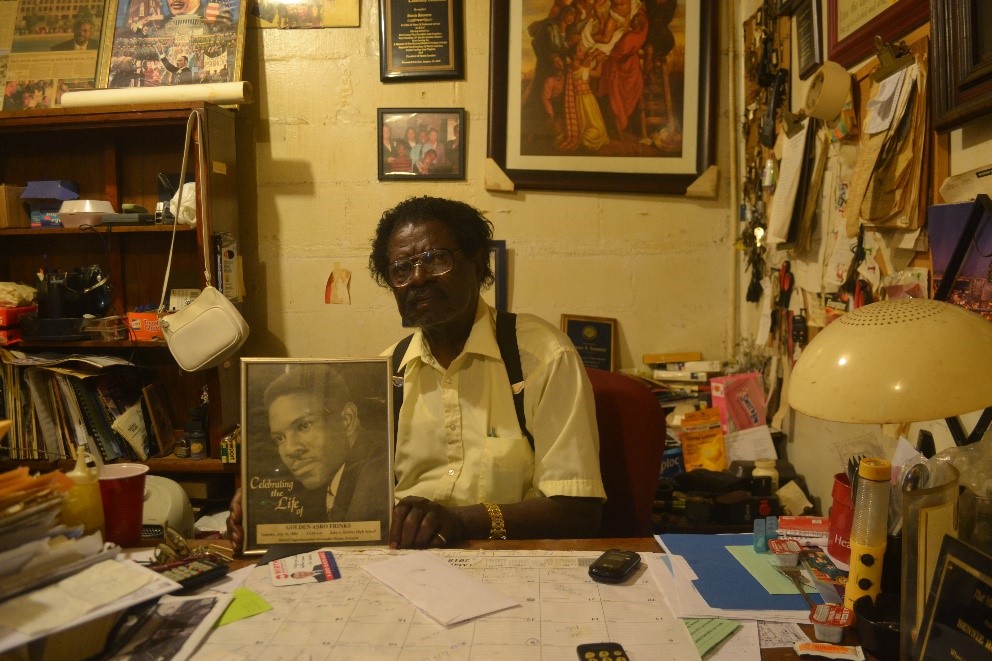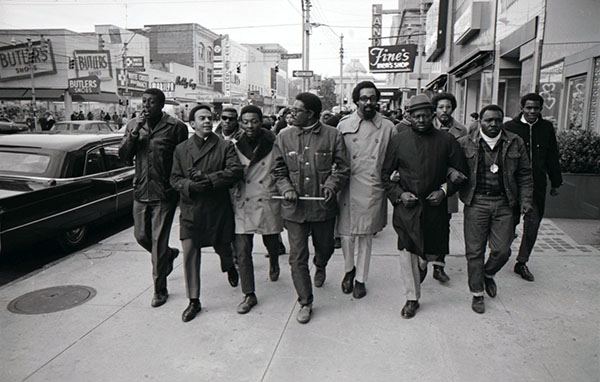Rountree, Bennie Robert
By Steven A. Hill. Copyright 2018. For personal educational use and not for further distribution.
27 April 1935 -
Bennie Robert Rountree is an African American Civil Rights leader and businessman from Pitt County, North Carolina.
Bennie Robert Rountree, a Pitt County Civil Rights leader and 2018 state president of the Southern Christian Leadership Conference (SCLC), was born on April 27, 1935. Both his parents, Leana and Henry Rountree, died before Bennie was 4 years old and Anna May Monk, Rountree’s sister, adopted him. Rountree was a member of the Arthur Free Will Baptist Church, attended Nichols School in the Bell Arthur community of Pitt County, completing the seventh grade. Bennie Rountree married Christine Anderson Rountree and together had 8 children, 4 of whom were adopted.
 As a child working on a farm, Rountree developed a strong work ethic that persisted throughout his life. At age 17 he worked at the Southern Bakery; at age 18, he opened a filling station; at age 24, Rountree owned and operated a restaurant on the Block, a downtown area of Greenville for African Americans during segregation. During the Jim Crow era with few opportunities available to blacks, Rountree’s determined and principled work habits impressed many influential whites who assisted his development as a businessman and community leader.
As a child working on a farm, Rountree developed a strong work ethic that persisted throughout his life. At age 17 he worked at the Southern Bakery; at age 18, he opened a filling station; at age 24, Rountree owned and operated a restaurant on the Block, a downtown area of Greenville for African Americans during segregation. During the Jim Crow era with few opportunities available to blacks, Rountree’s determined and principled work habits impressed many influential whites who assisted his development as a businessman and community leader.
W.C. Clark, an influential white business owner and entrepreneur who owned most of the Block in the 1950s, recognized Rountree’s diligence, dependability, and willingness to assist the less fortunate in his community, often at his own expense. W.C. Clark proved a great benefactor for Rountree. Clark told Rountree that he wanted him to have the Block, after he died. Clark, suspecting that young Rountree did not possess the money to buy the property, arranged for a manageable payment schedule.
Rountree’s start as a community leader began as an unaffiliated solo effort while a teenager on a Pitt County farm where he tried get blacks to understand their history to empower them. After Rountree learned of Martin Luther King, Jr., he joined the Southern Christian Leadership Organization (SCLC) in 1957. During his career, Rountree met and worked closely with Martin Luther King, Jr., as well as Golden Astro Frinks. By 1970, Rountree had risen to become the president of the Pitt County Chapter of the SCLC and later, state President of the organization.
Rountree recalled in a 2018 interview with the author that a lot of details about Civil Rights have not been documented, because a lot of “it was done behind closed doors.” For example, when whites saw that Rountree selflessly fed 400-500 people on Thanksgiving and Christmas holidays in the early 1960s and would also “take [poor] kids to the store to buy gifts,” white citizens assisted him, but quietly. Rountree said that many whites donated hundreds of dollars in unmarked envelopes with one request: benefactors did not want their names mentioned because they were fearful of white retribution for helping blacks. At times, larger amounts were received from wealthy whites, Rountree recalled that envelopes were sometimes received that were filled with thousands of dollars to assist impoverished black families, as well as for bail money for those who had been unjustly jailed.
 Before Rountree rose to become president of the Pitt County branch of the SCLC, he had been vice-president under the leadership of George Garrett, the older brother of D.D. Garrett, leader of Pitt County’s NAACP. George Garret’s racial leadership was much more brash and combative than his brother’s, remembered Rountree. The SCLC was more vocal than the NAACP; one difference was that the NAACP “would negotiate around a table, but the SCLC would protest and take it to the streets,” said Rountree. By comparison, Rountree remembered that Golden Frinks, the North Carolina’s Field Secretary for the SCLC, was much more of an agitator than George Garrett.
Before Rountree rose to become president of the Pitt County branch of the SCLC, he had been vice-president under the leadership of George Garrett, the older brother of D.D. Garrett, leader of Pitt County’s NAACP. George Garret’s racial leadership was much more brash and combative than his brother’s, remembered Rountree. The SCLC was more vocal than the NAACP; one difference was that the NAACP “would negotiate around a table, but the SCLC would protest and take it to the streets,” said Rountree. By comparison, Rountree remembered that Golden Frinks, the North Carolina’s Field Secretary for the SCLC, was much more of an agitator than George Garrett.
This was proven during the fall of 1971 when Frinks arrived in Pitt County to help organize and lead protests over the killing of black day laborer William Murphy by State Trooper William Day. Frinks and Rountree combined protests over the slaying of Murphy, which Frinks characterized as “murder,” with black student protests at Ayden-Grifton High School over perceived racial inadequacies during the first year of full racial integration in the school. Rountree assisted Frinks and was arrested during these protests. The five months of mayhem during 1971 in Pitt County saw the arrest of over 1,000 protesters, many of whom were students, and a declared state of emergency and an imminent threat of riot in Pitt County’s public schools. But Rountree earned a reputation for being a “peacemaker,” because he most often acted as an intermediary between the races to mollify racial tensions.
Bennie Rountree occupies a significant place in the tradition of racial diplomacy in Pitt County. From 1903 to 1942, the undisputed race leader was Charles Montgomery Eppes, an African American educational leader in the county. His death saw the role of racial leadership shift to non-school leaders. Between the 1940s and the late 1960s, a new generation of race leaders came of age who were independent black businessmen not reliant upon the approval of white employers. In the Jim Crow era, Rountree’s connections and selfless leadership made him a race leader, alongside his contemporaries George Garrett and Denison Dover Garrett.
References:
Rountree, Bennie Robert. Interview by Steven Hill, July 18, 2018 and August 7, 2018.
“'Hoodie' rally draws 200,” Daily Reflector (Greenville, NC), March 27, 2012.
Kennedy, Kathryn. “Group gathers seeking change after recent violence,” Daily Reflector (Greenville, NC), May 30, 2010.
Myrdal, Gunnar, and Sissela Bok. 2007. An american dilemma: the negro problem and modern democracy. New York: Harper & Bros.
Wells, Goldie F., and Crystal Sanders. 2009. Golden Asro Frinks: telling the unsung song : a biography of a civil rights activist. Salt Lake City, Utah: Aardvark Global Pub.
“4 Arrested In Protests In Ayden,” News and Observer (Raleigh, NC), October 30, 1971.
“Back in the Day: Honoring King,” Daily Reflector (Greenville, NC), January 14, 2017.
Kennedy, Kathryn. “Black leaders declare 'state of emergency," Daily Reflector (Greenville, NC), July 19, 2010.
Hardee, Roy. “Protests Intensify In Ayden Slaying,” News and Observer (Raleigh, NC), August 26, 1971.
Linn, Jim. “Ayden Slaying Ruled Self Defense,” News and Observer (Raleigh, NC), August 28, 1971.
Lang, Melvin. “Citizens Taking Up Arms, Ayden: Rural Terror,” Daily Times News (Burlington, NC), September 10, 1971.
Image Credit:
Hill, Steven. "Bennie Rountree." Photograph. July 28, 2018.
Raleigh News and Observer. [SCLC Hyde County March, February 14, 1969]. Photography. February 14, 1969. N&O Negative Collection, State Archives of North Carolina.
14 September 2018 | Hill, Steven